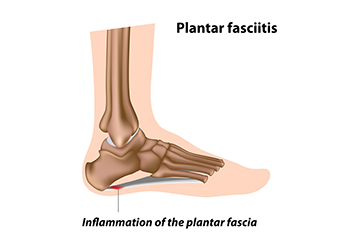
Plantar fasciitis involves the tearing or overstretching of the plantar fascia, which is the thick band of tissue that runs from the heel to the toes on the sole of the foot. When this happens, pain is felt on the bottom of the foot while walking, or from prolonged sitting. It can take a long time to recover from plantar fasciitis, and it is a condition that can interfere with comfortable functioning. Stretching and strengthening exercises are often suggested to help in the healing process of this ailment. Water therapy has been found to be an effective way to exercise and obtain some relief during recovery from plantar fasciitis. Participation in aquatic fitness can help to increase the range of motion and strengthen the foot. Unlike walking, running, or other weight-bearing exercises, water acts as a shock absorber, and aqua therapy may help to relieve stressful joints. If you feel you may have plantar fasciitis, it is suggested that you visit a podiatrist for an evaluation and treatment, which may include hydrotherapy.
Plantar fasciitis is a common foot condition that is often caused by a strain injury. If you are experiencing heel pain or symptoms of plantar fasciitis, contact Kenneth Donovan, DPM from Advanced Care Foot and Ankle. Our doctor can provide the care you need to keep you pain-free and on your feet.
What Is Plantar Fasciitis?
Plantar fasciitis is one of the most common causes of heel pain. The plantar fascia is a ligament that connects your heel to the front of your foot. When this ligament becomes inflamed, plantar fasciitis is the result. If you have plantar fasciitis you will have a stabbing pain that usually occurs with your first steps in the morning. As the day progresses and you walk around more, this pain will start to disappear, but it will return after long periods of standing or sitting.
What Causes Plantar Fasciitis?
- Excessive running
- Having high arches in your feet
- Other foot issues such as flat feet
- Pregnancy (due to the sudden weight gain)
- Being on your feet very often
There are some risk factors that may make you more likely to develop plantar fasciitis compared to others. The condition most commonly affects adults between the ages of 40 and 60. It also tends to affect people who are obese because the extra pounds result in extra stress being placed on the plantar fascia.
Prevention
- Take good care of your feet – Wear shoes that have good arch support and heel cushioning.
- Maintain a healthy weight
- If you are a runner, alternate running with other sports that won’t cause heel pain
There are a variety of treatment options available for plantar fasciitis along with the pain that accompanies it. Additionally, physical therapy is a very important component in the treatment process. It is important that you meet with your podiatrist to determine which treatment option is best for you.
If you have any questions, please feel free to contact our office located in Charleston, SC . We offer the newest diagnostic and treatment technologies for all your foot care needs.
